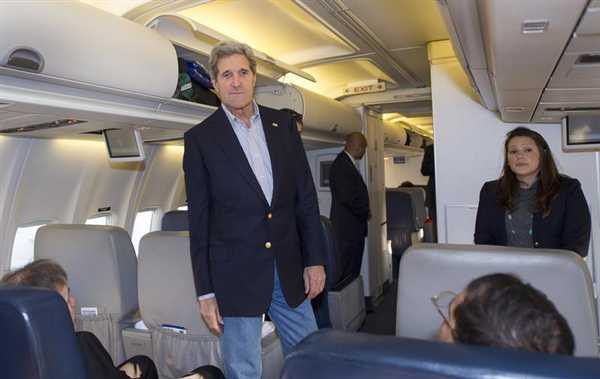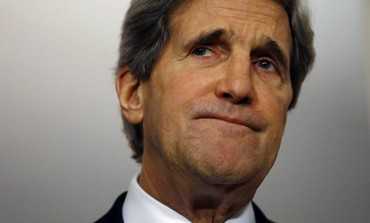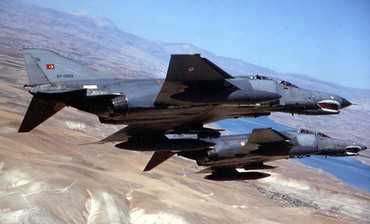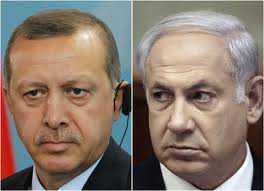Kerry urges Turkey, Israel to normalize relations
English.news.cn 2013-04-07 19:09:49
• John Kerry on Sunday urged Turkish leaders to speedily restore full diplomatic relations with Israel.
• Kerry called on the two countries to send back their ambassadors to each other as soon as possible.
• Obama brokered reconciliation between Turkey and Israel during his trip to the region last month.
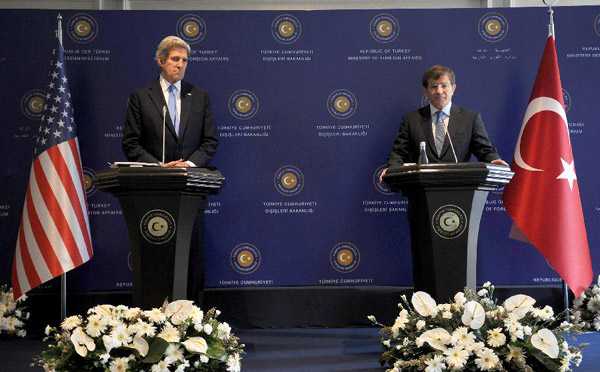
U.S. Secretary of State John Kerry (L) attends a joint press conference with Turkish Foreign Minister Ahmet Davutoglu after arriving at Istanbul, Turkey, April 7, 2013, as a part of his third trip to the Middle East in one month. Kerry will meet with Turkish Prime Minister Erdogan Sunday afternoon. (Xinhua/Lu Zhe)
ISTANBUL, April 7 (Xinhua) — Visiting U.S. Secretary of State John Kerry on Sunday urged here Turkish leaders to speedily restore full diplomatic relations with Israel, saying Washington sees both countries as anchor of stability in the Middle East.
The top U.S. diplomat made the remarks at a press conference shortly after his talks with Turkish Foreign Minister Ahmet Davutoglu in the coastal city of Istanbul, the first leg of his third trip to the Middle East in one month.
Kerry called on the two countries, both important U.S. allies, to send back their ambassadors to each other as soon as possible, adding the Turkish-Israeli cooperation will help tackle challenges confronting the region.
John Kerry headed to the Middle East on Saturday in a fresh bid to unlock long-stalled Israeli-Palestinian peace talks.
“We would like to see the relationship, which is important for the Middle East region, for the Israel-Palestine peace process,” Kerry said at the conference.
He added that Turkey can be a key contributor to future development of the West Bank and Gaza.
U.S. President Barack Obama brokered reconciliation between Turkey and Israel during his trip to the region last month. Israeli Prime Minister Benjamin Netanyahu offered an apology to Turkey after Obama’s visit for the 2010 raid on a Gaza-bound aid flotilla.
The raid, killing eight Turks and one Turkish American, seriously strained ties between the two close regional allies to the United States.
On this issue, Davutoglu said compensation for flotilla deaths and lift of the embargo against Gaza are Turkey’s demand for Israel in the next stage.
“Victims in this incident have to be compensated… An offense was done and it has to be taken to accountability,” Davutoglu said, setting conditions for normalizing ties with Israel.
The Turkish foreign minister also urged improving the living standards of people in Gaza. “Turkey wants to see a two-state solution between Israel and Palestine based on pre-1967 lines, which will aims to establish peaceful order in the Middle East.”
Speaking of Iran’s nuclear program, Kerry said the international community would continue talks with Iran to resolve the decade-old issue but stressed the process could not continue for ever.
“Diplomacy is a painful task and a task for the patient,” he said, in reference to the talks between Iran and the world powers in Kazakhstan that ended on Saturday after failing to break a deadlock.
On the anti-terrorism front, Kerry welcomed the recent disarmament by the Kurdish Workers’ Party in Turkey and praised Turkish government’s efforts to end the three-decade old conflict.
He added that difficult steps lay ahead and lasting peace will improve lives of all citizens.
On the Syrian issue, both Kerry and Davutoglu reiterated their stance that Syrian President Bashar al-Assad must go. They also agreed that a new round of “Friends of Syria” meeting should be held as soon as possible.
Later on Sunday, Turkish Prime Minister Recep Tayyip Erdogan will meet with Kerry in Istanbul.
The U.S. diplomat will also visit Israel, Britain, South Korea, China and Japan, where talks will focus on North Korea’s nuclear program.
Related:
News Analysis: Rapprochement reveals alignment between Turkey, Israel in regional politics
ANKARA, March 23 (Xinhua) — The U.S.-brokered normalization of ties between Turkey and Israel following the latter’s belated apology for a naval raid three years ago means a greater alignment of both countries’ goals in the Mideast against the backdrop of fast-paced developments in the region.
Turkey severed diplomatic and security ties with Israel after eight Turks and a Turkish American aboard a Gaza-bound aid flotilla were killed in May 2010 during a violent confrontation with Israeli commandos. Full story
Israel, Turkey to restore relations after Netanyahu apologizes for Gaza flotilla deaths
JERUSALEM, March 22 (Xinhua) — Israeli Prime Minister Benjamin Netanyahu on Friday phoned his Turkish counterpart, Recep Tayyip Erdogan, and apologized for an Israeli naval raid three years ago in which nine Turkish nationals were killed, with the two leaders agreeing to normalize bilateral relations, Netanyahu’s office said.
The dramatic announcement came shortly after U.S. President Barack Obama departed Israel at the end of a three-day visit.
via Kerry urges Turkey, Israel to normalize relations – Xinhua | English.news.cn.

